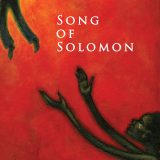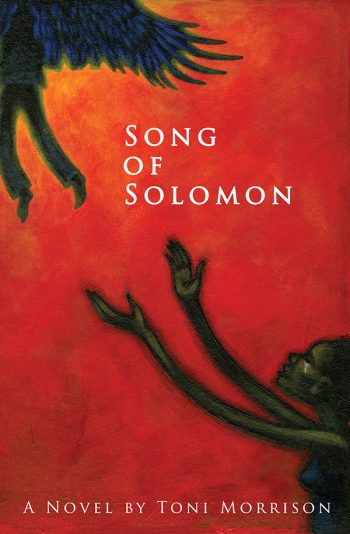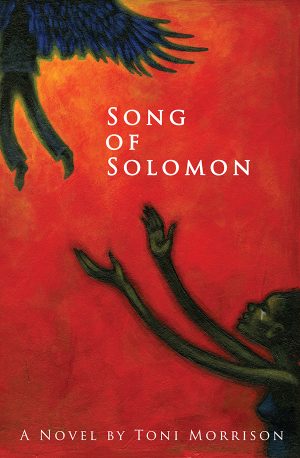Song of Solomon – Toni Morrison – 1977
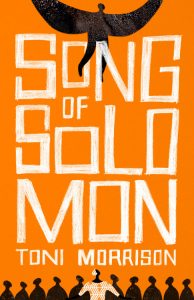
The following is a compilation of discussions and reviews from the previous version of our website. We hope you enjoy these older deliberations. Just beware, there may be spoilers in here. To add your own review or remarks, please scroll down to the comment box. — ReadLit Team
Posted by Joffre on 11/11/2015, 8:28:51
I’ve just finished SoS, and like Steven, I liked it a lot more than Beloved. I don’t at all dislike Beloved, but I found SoS one of the most enjoyable things I’ve read recently. There were some low points. After three or four days of high interest, I came to something I felt less amused by. I can’t really remember what it was. And later, I felt somewhat bored by the entanglement with Hagar though her repeated attempts to kill milkman reminded me of that woman who keeps trying to kill Yossarian in Catch 22. The part I liked most also reminded me of another book. Milkman’s decoding of the children’s Sugarman/Solomon song is like Oedipa’s catching the sound of Thurn and Taxis in “turning taxis by the sea.”
I won’t call SoS a favorite, but I would be more open now to a recommendation of another Morrison novel.
I thing I’m going to read A Bend in the River now.
~
Posted by Sterling on 13/11/2015, 21:21:48, in reply to “Song of Solomon”
Hey, Joffre. I haven’t commented on your post because I have not read a word of Morrison. Frankly, I saw the movie of Beloved and decided that she didn’t appear to be the sort of writer with whom I wished to spend time. I realize that a movie adaptation is an unfair way to judge a novelist, but I assumed that the film followed the plot of the novel reasonably closely. My take on such writing is this: I agree that slavery was a great evil. I don’t need to be beaten about the head and shoulders to be convinced. (It may be even more horrible to say, but I don’t read Holocaust novels for much the same reason.)
However, your enthusiasm for Song of Solomon, especially your description of it as “enjoyable,” has just placed Morrison back on the list of authors that I may one day read. After all, I did’t expect to enjoy Invisible Man either!
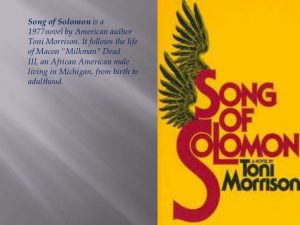
Posted by Steven on 13/11/2015, 23:54:40, in reply to “Re: Song of Solomon”
Joffre, that is a very astute comparison of Song of Solomon with The Crying of Lot 49. Both books give the impression of being up on a plateau I can occasionally glimpse but never reach. That there may be hidden meanings in the rhymes we learned as children is a fascinating topic. Unfortunately they have been supplanted in recent generations by the materialistic scripts of commercial TV programming. My grandchildren never learned “Ashes, ashes, all fall down,” which may or may not be a reference to the Black Death.
Sterling, I’m certainly with you about not wanting to be beaten over the head and shoulders about social issues and historical justice. I do think Song of Solomon is worth reading. I’ve only read two other works by Morrison (Beloved and Bluest Eye), and wouldn’t recommend either unless you were particularly enamored of SoS. They’re more of the “beating over the head and shoulders” variety.
~
Posted by Sterling on 14/11/2015, 11:38:53, in reply to “Re: Song of Solomon”
Thanks to you both, Steven and Joffre. Based on your recommendation, I probably will read Song of Solomon soon. I vaguely wished to read at least something by all the American Nobel Prize winners (and many of the others, of course, although I think that the Nobel Prize committee is an absolute hotbed of political correctness!). Now I know which novel to try by Ms. Morrison.
~
Posted by Lale on 6/12/2015, 10:20:45, in reply to “Re: Song of Solomon”
I read Song of Solomon 2 years ago in a class on world literature – nobel prize winners.
It didn’t make any of my top lists. I thought it was OK.
Later on, my prof and I discovered that the concept of one killer per day (Sunday killer etc.) was (not to accuse the author in voluntary plagiarism) identical to The Man Who Was Thursday (1907) by G. K. Chesterton which we read here at the book club.
Did anyone catch that? Some of the other themes are similar too, anarchism, for instance.
Here are some of my questions:
1
In her Nobel lecture, Toni Morrison has harsh words for the language of the oppressor:
So I choose to read the bird as language and the woman as a practiced writer. […] She believes that if the bird in the hands of her visitors is dead the custodians are responsible for the corpse. For her a dead language is not only one no longer spoken or written, it is unyielding language content to admire its own paralysis. Like statist language, censored and censoring. Ruthless in its policing duties, it has no desire or purpose other than maintaining the free range of its own narcotic narcissism, its own exclusivity and dominance. However moribund, it is not without effect for it actively thwarts the intellect, stalls conscience, suppresses human potential. Unreceptive to interrogation, it cannot form or tolerate new ideas, shape other thoughts, tell another story, fill baffling silences. Official language smitheryed to sanction ignorance and preserve privilege is a suit of armor polished to shocking glitter, a husk from which the knight departed long ago. Yet there it is: dumb, predatory, sentimental. Exciting reverence in schoolchildren, providing shelter for despots, summoning false memories of stability, harmony among the public.
In Song of Solomon, are there examples that could be identified as the language that “thwarts the intellect, stalls conscience, suppresses human potential”? Or, in this book, do we only have the language that can still “tolerate new ideas, shape other thoughts, tell another story, fill baffling silences”?
2
What are the similarities between Dr. Foster and his son-in-law Macon Dead? Can we place them within the oppressor language or the oppressed language?
3
The only woman Milkman really loves is Pilate. Pilate is truly remarkable in her independence and her skills. Her lack of a navel symbolises her uniqueness (a quick search on the internet shows that people may lose their navels due to surgery but no one can be born without one.) When she is dying she laments not having known more people: “I wish I’d a knowed more people. I would of loved ‘em all. If I’d a knowed more, I would a loved more.” Is anyone capable of loving all the people she knows? Is this a possible human trait or is this as impossible as not having a navel?
4
Can we attribute Guitar’s commitment to the principle that “for every black person killed, one white person must be killed” to Morrison’s assertion that in United States children have bitten their tongues off and use bullets instead”?
A detail in the book I need help in understanding:
The night Milkman hits his father, he is walking on the street against the stream of people who are all going in one direction. Milkman is the only person going in the opposite direction against the crowd. I understand the reason of everyone going in one direction and the symbolism of Milkman’s going in the opposite direction. However, this is the part I don’t understand: Why is nobody walking on the other side of the street? The opposite sidewalk is empty, what does that signify?
Trivia Question:
Can you name all the seven people in Seven Days group?
Lale
~
Your comments are very welcome. Please sign in and use the contribute box below to write a review or to add your comments. You may also enjoy our Talk Literature page for active discussions.


